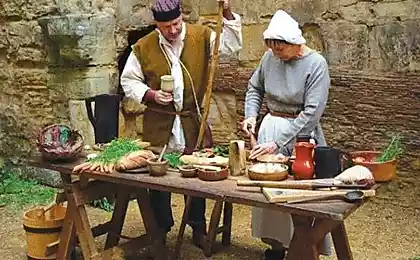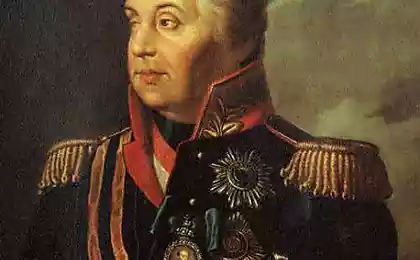1254
10 Delete mercenaries, ruining medieval Europe
In Italy they were known by the simple name - "mercenaries." Now these people are known to organized crime or as mercenaries They mostly made a living killing, extortion and terror.
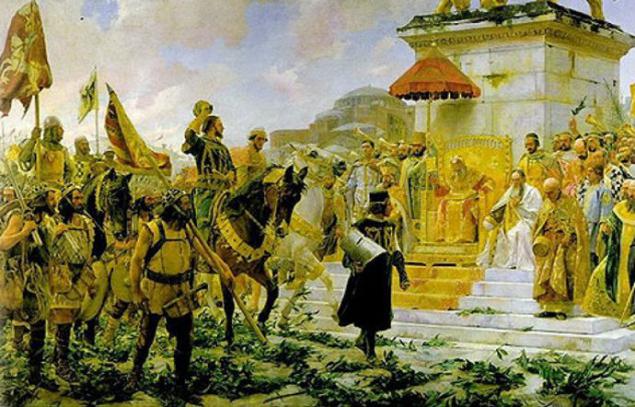
10. Roger de Flor.
Roger de Flor was born in the province of Brindisi, Italy, in 1267. As a boy, he went to sea and eventually became a Templar. He used his status to their advantage, and after the capture of Acre in 1291, engaged in looting of local residents. When found out about it, he was expelled from the Templars. Fled to Genoa, he became commander of the Spanish mercenaries «almogauares». The name they got from the Arab almogauar, which means "one who empties."
In 1303 the Byzantines took Roger to the service, which was then subordinated to the King of Aragon. His mission was to help in the fight against the Ottoman Turks, who had just taken from the Empire Bithynia. In Constantinople, Roger married the niece of Emperor Andronicus II and became the Grand Duke. 1500 knights and 4000 own mercenaries, Roger won a battle against the Turks, and at the same time robbed the inhabitants of the Byzantine Anatolia, now part of Turkey. The government condemned it and called a bandit, but the success turned the head of Roger, and he dreamed of his own dominion in Anatolia.
Emperor Michael IX was convinced that Roger and his unruly mercenaries must be destroyed. In 1305, Roger was invited to a banquet at Adrianople, hosted by Michael. There he was ambushed and killed, as well as 130 of his men. The remaining mercenaries ravaged the countryside, as a sign of revenge, and later they settled in Greece and founded in 1311 the Duchy of Athens.
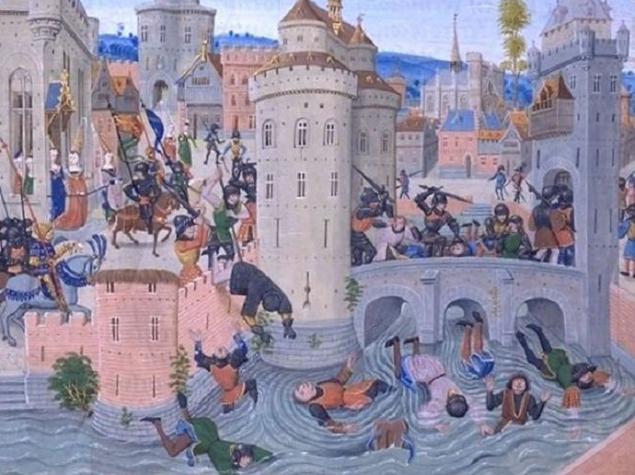
9. Basco de Molion.
Basco de Molion was the leader of the group that came to Burgundy to filibuster different nationalities. In Moliona was the first experience of battle at Poitiers, and later, he went to Prussia with the Count de Foix and fought against the peasant uprising Jacquerie on their return to France.
Molion brought with him about 12,000 men. This enormous power of the castle took Brin and crushed France, accumulated such wealth that the Pope in Avignon became concerned for his safety.
Technically Molion fought for the King of England, but an independent filibuster, his main interest were the money. Molion recalled: "Sometimes Meria was not even a horse, and at other times I was too rich, and all because the success came, it went." The story of wealth Moliona was written by a French chronicler Froyssartom, who met him at the hostel Pyrenees. Froyssart recalled that he "came with a lot of followers and baggage ... It was the same pack horses, like the eminent Baron, and he and his men ate with silver plates." Not a bad way of life for the robber.
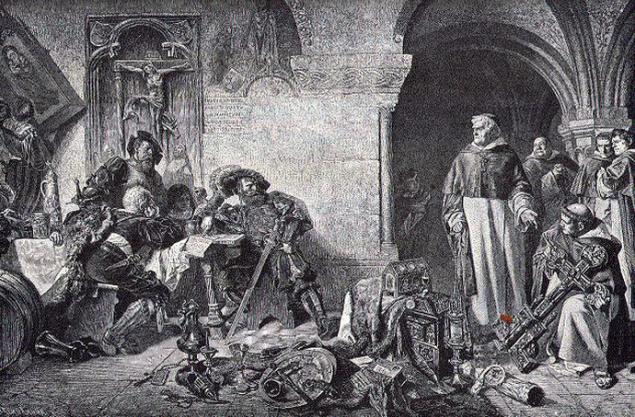
8. Werner von Urslingen.
Taking the title of "Duke" Werner von Urslingen nashil his spear on the motto "the enemy of compassion, mercy and God," and he matched it in all possible ways. The principle of operation of Werner was the invasion of a peaceful area with intent to rob, abuse and murder people. But before leaving, he burned all the buildings. He reported his crimes to the authorities, threatened them, extorting huge sums. And in 1339, Werner and his gang have been declared "plague society."
In 1342 Werner founded the Great Company. At the peak of its power band of 6000 it consisted of men, mostly armored cavalry. Werner demanded strict discipline and adherence to a code of laws, including equal division of income. Later military companies have tried to simulate the circuit Great Company, but it was possible to nobody.
In 1347, Werner maintained Queen Joanna of Naples I, the daughter of the King of Hungary Louis I, after Louis invaded Naples to avenge the murder of his brother. Joanna Werner helped to return to Naples and to protect her from opposing mercenary. On behalf of Joanna Werner attacked Baron grinds, taking half a million guilders. Eventually Werner returned to Germany with the loot.
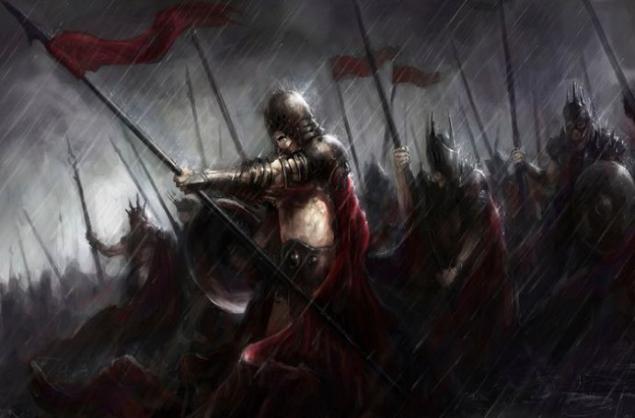
7. Conrad Landau.
German Conrad Landau took control of the Great Company in 1354, and worked in the regions of Tuscany, Umbria, Romagna and Lombardy. He collected tribute from all the cities and had a good profit. As Conrad explained directly by the papal legate, before the invasion of church lands: "It is our custom to rob, to no one resisted. Our main income is derived from the areas in which we invade. Who values his life will pay for peace and quiet us. »
In at least one case, Conrad got what he deserved when he was ambushed on the way the Florentines to Siena. Conrad was wounded, his team defeated, and angry locals took everything they had with them. But it was only a temporary setback, as Conrad did not stop and continued to make huge profits from extortion. His profits allowed his father, who stayed in Germany, to redeem the family castle and the lands they lost because of debt several years earlier.
Great Company was eventually hired by the governor of the Visconti of Milan, to crack down on rival Albert White Company Sterza which "feeds" to the Milanese territory. In 1363 the two companies met in Santurina. Conrad scored first defense, but his Hungarian soldiers suddenly refused to fight with the Hungarians in the opposing army. Their desertion tipped the scales in favor of the White Company, and Conrad was killed in the ensuing battle.
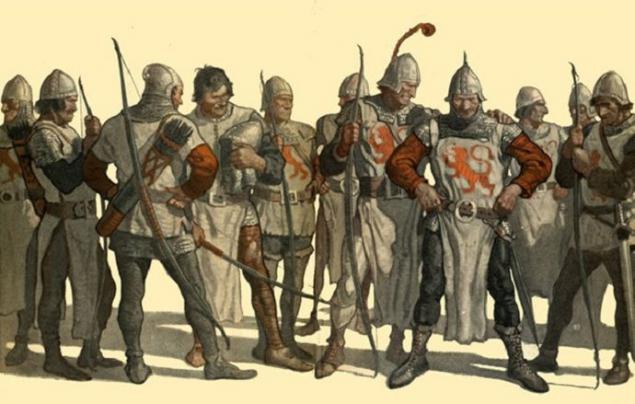
6. Albert Sterz.
The most infamous group of bandits is White Company, founded by German Albert Sterzom. It got its name from the white robes worn by the troops, and white banners, they waved. When Sterze company was unsurpassed performance. His 3,500 riders and 2,000 infantrymen were perfectly organized and well armed. They were engineers who lay mines and built extension ladders and towers for sieges.
In 1360 he moved Sterz companies in Italy, the fertile area is constantly warring city-states. Along the way, he recruited an English knight named John Hawkwood, who quickly rose through the "career ladder" because of its mediation capacity. Sterz soon regretted his decision. His people Impressed leadership Hawkwood, overthrew him and gave command of the Englishman. Jealous Sterz offended waiting a chance to take revenge.
The company signed a contract with Pisa to attack her rival, Florence. City prepared for the attack and stopped the attack Hawkwood. The moment has come Sterza. He suddenly moved to the other side, taking the men loyal to him. White Company broke, and Hawkwood left with only 800 men. After the war, he took the remains Sterz White Company and merged them with a group of supporting his German mercenary Hennekina Bomgartena. The new force, called the company Star Sterzu allowed to inflict a crushing defeat to his rival Hawkwood.
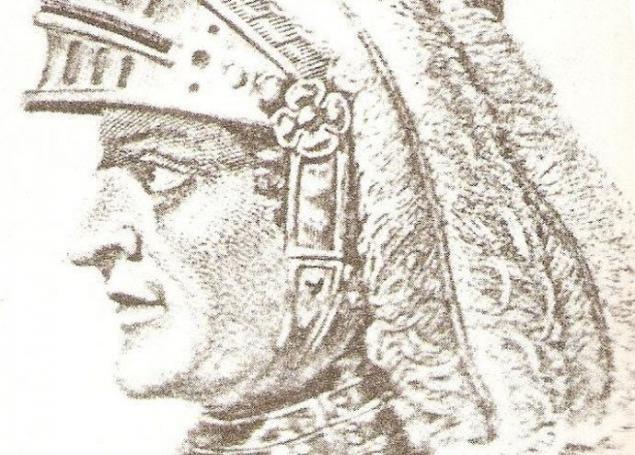
5. Alberico de Barbyano.
Alberico de Barbyano, a native of Italy, began his career as a captain in the army of Milan. Later, he hired Florence, Venice and Naples. Kudos to Alberico came in 1377 when he took part in the horrific massacre in Tsezene. Pope Gregory XI ordered to subdue unruly city of Romagna and Cardinal Robert Breton hired mercenaries, "the most cruel and bestial race of France." Even after the capitulation and surrender of weapons, residents were killed in the three-day Cesena bloodshed. Piles of corpses in the town square left to be eaten by dogs.
In 1378 Alberico formed company Saint. George. Unlike previous companies, it consisted entirely of Italians who swore "eternal hatred and hostility" to all foreigners. Alberico opposed and defeated Clement VII Breton on behalf of Pope Urban VI, who announced that Italy is now "free from the barbarians." But nationalist slogans were simply empty bombast. Once Alberico drove the Bretons, he began to plunder the Italian cities in Tuscany. His new group, Company Hook, consisted of Germans, Hungarians, and the Bretons.
At the end of the 14th century, Alberico had fought during the war between Florence and Milan, passing the one, then the other side. He served Naples at sunset of his career and died in 1409. Alberico credited with such innovations as improved military armor and aggressive tactics on the battlefield, especially in cavalry attack. His practice replenish troops own vassals in the novel, which leads to greater unity, the embryo is considered by some the final unification of Italy in the 19th century.
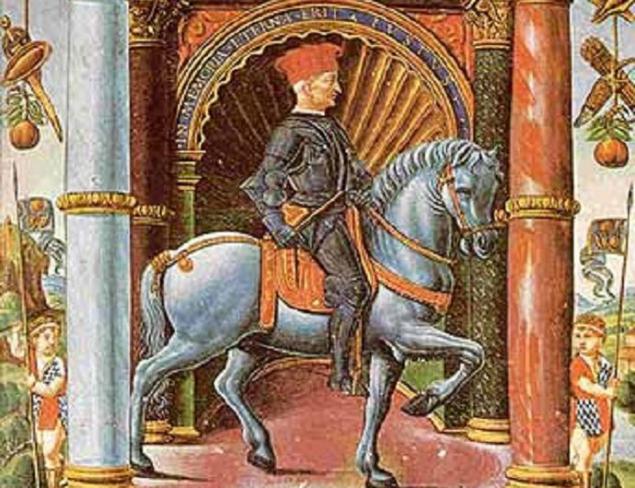
4. Muzio and Francesco Sforza.
Muzio Attendolo was the first famous member of the family that ruled Milan. He was originally from the village Kotignola in novels and served under the leadership of the company Alberico de Barbyano. Alberico called him Sforza, referring to the "power", and as a freelance mercenary, he made it his pseudonym.
In 1398 he worked for the governor of Milan, but soon left to fight for Florence and Ferrara. Naples in 1412 bought his services and became a constable Muzio kingdom. During the chaotic reign of Queen Joanna II rewarded him alternately lands and thrown in jail and tortured. In 1424 Muzio drowned in the river during the battle against the same mercenary.
Muzio son Francesco was the most successful captain hired the 15th century. Francesco Visconti served in the struggle against Venice and then against Venice Visconti. Francesco first attacked the Pope, but then sided with him and protected him. To keep Francesco constantly on the side of Milan, Duke Filippo married him to his only daughter in 1441. He wanted to succeed as after the death of Duke Filippo, but the inhabitants of Milan declared itself a republic. Francesco Milan besieged and took the title in 1450. His strength is not in vain called Sforza.
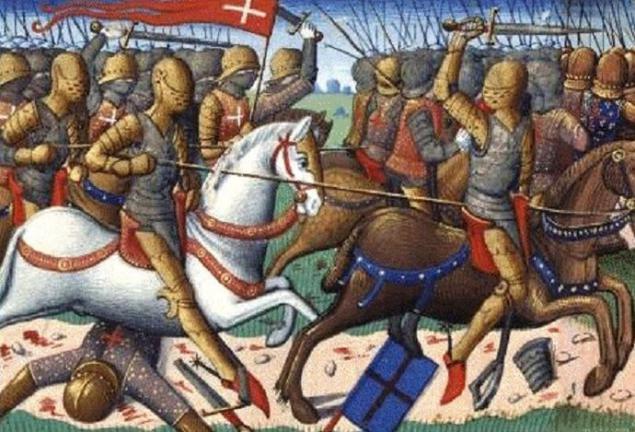
3. Rodrigo de Vilyandrando.
Many of the mercenaries were not opposed to rob their own employers. It is practiced and Rodrigo de Vilyandrando, one of the greatest 15th-century mercenaries. Rodrigo was born in Castile in 1380. While traveling to France in search of a military career, he first joined the mercenary army Amaury de Severac.
Rodrigo formed his own mercenary company in 1420 and moved to the other side, offering his services to the French Dauphin Charles. But that did not stop him from extorting money from towns and estates in Languedoc and robberies in the countryside, in the possession of his employer, Charles. Charles ordered him to stop and attacked the British, but Rodrigo refused and continued to advance towards Toulouse, where he took on the job even more men. Eventually he attacked the British captured Bordeaux and was forgiven Charles. In another battle in 400 Anthony his men defeated the Burgundians, one of which is hidden in a hollow tree to escape. He could not get rid of the armor, and his skeleton discovered only when the tree was felled in 1672.
At the peak of the power commanded by Rodrigo 10,000 mercenaries. He demanded ransoms from the nobility and the "protection money" from local residents if they wanted to protect themselves from the murders and robberies. His forays into Gascony earned him the nickname "Emperor Marauders." Grown rich on their business, Rodrigo finally calmed down in 1440 and returned to his native Castile. He donated all his wealth to the monastery and died in 1457.
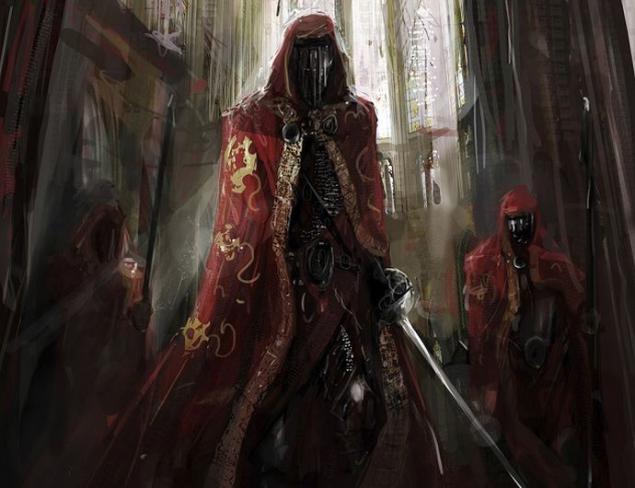
. Arnaud de Servolo.
Born into a noble Gascon family, Arnaud de Servolo was a high priest in the diocese of Perigueux. Being a man of God did not stop him awry "bandits and men of dubious origin." He was deprived of the parish the bishop of Bordeaux, so Arno could do all day banditry. His specialty was robbing locks. Once Arnaud took three castles in Angouleme, while their employer does not pay for their services. French Crown accused him of stealing when he sacked the castle in Normandy, while was at work at the French king Jean II.
With the capture of Jean II in Poitiers Arnaud has lost his job and began to plunder the rich and peaceful area of Provence. Approaching Avignon, he forced the Pope tremble. "He went to Avignon with a lot of his followers, and was received with respect, as if he was the king of France and dined several times with the Pope and the Cardinals. All his sins are forgotten, and when he left, he was given 40,000 crowns [20000 gold florins], that he distributed them among his people. The company left the area, but still remained under the command of the High Priest. "
By moving their activity in Burgundy, Arnaud seized one lock after another, until it is not paid off by 2500 gold francs. In 1365 Pope Urban V recruited Arnaud to conduct a crusade against the Turks, but the real purpose of the Pope was to push the filibusters from the Rhone region. Army Arno reached Lyon, but refused to go further. Without food and pay his army ventured dispute with the Arno, which ended in his murder.
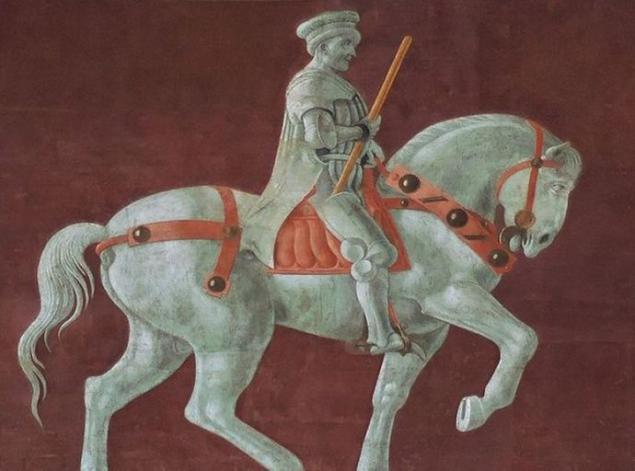
1. Sir John Hawkwood.
Despite a successful career in the White Company, Sir John Hawkwood died quite wealthy people and even won the frescoes in Florence Cathedral.
Born in a family of Essex landowner, Hawkwood went to France to fight for Edward III, was when he was 18 years old. He was knighted for the victory of the British in Poitiers, but after agreement Bretigny poor knight was left without work. He joined the Free Companies, to feed themselves.
As a soldier of the king, Hawkwood was an unknown warrior, but after turning in a freelancer, he has achieved astounding success. Finding happiness in the snake pit of medieval Italy, Hawkwood became the leader of White Company. The company began to terrorize Italy, gaining a reputation as "the most treacherous and malicious." The only good thing that could be said about them was that "they were not mutilated and burned their victims as the Hungarians." Local people call power Hawkwood "devils in human form."
The next 30 years in the business of murder, robbery and blackmail flourished. His skills caught the attention of the Pope, Florence, Milan, Pisa and Perugia. Hawkwood fought for all of them, because his only weakness was money, he betrayed them all when received a more attractive offer. Florins of gold flowed into the coffers of Hawkwood a river, he competed with banks and international trading houses. White Company had to hire lawyers and notaries to keep track of bribes and ransoms and prepare contracts.
Sir John became so influential in Italian politics, he was called upon to arrange the marriage of Edward's third son and daughter of Lionel Duke of Milan. He married the 17-year-old daughter of the Duke when he was 57 years old. It is proposed to Florence Hawkwood richest rewards and he ended his days as a general Florentines, contributing to the creation of the republic. By his death in 1394, Sir John made a reputation as "the most capable military commander of the Middle Ages."
--img11--
Source: www.liveinternet.ru

10. Roger de Flor.
Roger de Flor was born in the province of Brindisi, Italy, in 1267. As a boy, he went to sea and eventually became a Templar. He used his status to their advantage, and after the capture of Acre in 1291, engaged in looting of local residents. When found out about it, he was expelled from the Templars. Fled to Genoa, he became commander of the Spanish mercenaries «almogauares». The name they got from the Arab almogauar, which means "one who empties."
In 1303 the Byzantines took Roger to the service, which was then subordinated to the King of Aragon. His mission was to help in the fight against the Ottoman Turks, who had just taken from the Empire Bithynia. In Constantinople, Roger married the niece of Emperor Andronicus II and became the Grand Duke. 1500 knights and 4000 own mercenaries, Roger won a battle against the Turks, and at the same time robbed the inhabitants of the Byzantine Anatolia, now part of Turkey. The government condemned it and called a bandit, but the success turned the head of Roger, and he dreamed of his own dominion in Anatolia.
Emperor Michael IX was convinced that Roger and his unruly mercenaries must be destroyed. In 1305, Roger was invited to a banquet at Adrianople, hosted by Michael. There he was ambushed and killed, as well as 130 of his men. The remaining mercenaries ravaged the countryside, as a sign of revenge, and later they settled in Greece and founded in 1311 the Duchy of Athens.

9. Basco de Molion.
Basco de Molion was the leader of the group that came to Burgundy to filibuster different nationalities. In Moliona was the first experience of battle at Poitiers, and later, he went to Prussia with the Count de Foix and fought against the peasant uprising Jacquerie on their return to France.
Molion brought with him about 12,000 men. This enormous power of the castle took Brin and crushed France, accumulated such wealth that the Pope in Avignon became concerned for his safety.
Technically Molion fought for the King of England, but an independent filibuster, his main interest were the money. Molion recalled: "Sometimes Meria was not even a horse, and at other times I was too rich, and all because the success came, it went." The story of wealth Moliona was written by a French chronicler Froyssartom, who met him at the hostel Pyrenees. Froyssart recalled that he "came with a lot of followers and baggage ... It was the same pack horses, like the eminent Baron, and he and his men ate with silver plates." Not a bad way of life for the robber.

8. Werner von Urslingen.
Taking the title of "Duke" Werner von Urslingen nashil his spear on the motto "the enemy of compassion, mercy and God," and he matched it in all possible ways. The principle of operation of Werner was the invasion of a peaceful area with intent to rob, abuse and murder people. But before leaving, he burned all the buildings. He reported his crimes to the authorities, threatened them, extorting huge sums. And in 1339, Werner and his gang have been declared "plague society."
In 1342 Werner founded the Great Company. At the peak of its power band of 6000 it consisted of men, mostly armored cavalry. Werner demanded strict discipline and adherence to a code of laws, including equal division of income. Later military companies have tried to simulate the circuit Great Company, but it was possible to nobody.
In 1347, Werner maintained Queen Joanna of Naples I, the daughter of the King of Hungary Louis I, after Louis invaded Naples to avenge the murder of his brother. Joanna Werner helped to return to Naples and to protect her from opposing mercenary. On behalf of Joanna Werner attacked Baron grinds, taking half a million guilders. Eventually Werner returned to Germany with the loot.

7. Conrad Landau.
German Conrad Landau took control of the Great Company in 1354, and worked in the regions of Tuscany, Umbria, Romagna and Lombardy. He collected tribute from all the cities and had a good profit. As Conrad explained directly by the papal legate, before the invasion of church lands: "It is our custom to rob, to no one resisted. Our main income is derived from the areas in which we invade. Who values his life will pay for peace and quiet us. »
In at least one case, Conrad got what he deserved when he was ambushed on the way the Florentines to Siena. Conrad was wounded, his team defeated, and angry locals took everything they had with them. But it was only a temporary setback, as Conrad did not stop and continued to make huge profits from extortion. His profits allowed his father, who stayed in Germany, to redeem the family castle and the lands they lost because of debt several years earlier.
Great Company was eventually hired by the governor of the Visconti of Milan, to crack down on rival Albert White Company Sterza which "feeds" to the Milanese territory. In 1363 the two companies met in Santurina. Conrad scored first defense, but his Hungarian soldiers suddenly refused to fight with the Hungarians in the opposing army. Their desertion tipped the scales in favor of the White Company, and Conrad was killed in the ensuing battle.

6. Albert Sterz.
The most infamous group of bandits is White Company, founded by German Albert Sterzom. It got its name from the white robes worn by the troops, and white banners, they waved. When Sterze company was unsurpassed performance. His 3,500 riders and 2,000 infantrymen were perfectly organized and well armed. They were engineers who lay mines and built extension ladders and towers for sieges.
In 1360 he moved Sterz companies in Italy, the fertile area is constantly warring city-states. Along the way, he recruited an English knight named John Hawkwood, who quickly rose through the "career ladder" because of its mediation capacity. Sterz soon regretted his decision. His people Impressed leadership Hawkwood, overthrew him and gave command of the Englishman. Jealous Sterz offended waiting a chance to take revenge.
The company signed a contract with Pisa to attack her rival, Florence. City prepared for the attack and stopped the attack Hawkwood. The moment has come Sterza. He suddenly moved to the other side, taking the men loyal to him. White Company broke, and Hawkwood left with only 800 men. After the war, he took the remains Sterz White Company and merged them with a group of supporting his German mercenary Hennekina Bomgartena. The new force, called the company Star Sterzu allowed to inflict a crushing defeat to his rival Hawkwood.

5. Alberico de Barbyano.
Alberico de Barbyano, a native of Italy, began his career as a captain in the army of Milan. Later, he hired Florence, Venice and Naples. Kudos to Alberico came in 1377 when he took part in the horrific massacre in Tsezene. Pope Gregory XI ordered to subdue unruly city of Romagna and Cardinal Robert Breton hired mercenaries, "the most cruel and bestial race of France." Even after the capitulation and surrender of weapons, residents were killed in the three-day Cesena bloodshed. Piles of corpses in the town square left to be eaten by dogs.
In 1378 Alberico formed company Saint. George. Unlike previous companies, it consisted entirely of Italians who swore "eternal hatred and hostility" to all foreigners. Alberico opposed and defeated Clement VII Breton on behalf of Pope Urban VI, who announced that Italy is now "free from the barbarians." But nationalist slogans were simply empty bombast. Once Alberico drove the Bretons, he began to plunder the Italian cities in Tuscany. His new group, Company Hook, consisted of Germans, Hungarians, and the Bretons.
At the end of the 14th century, Alberico had fought during the war between Florence and Milan, passing the one, then the other side. He served Naples at sunset of his career and died in 1409. Alberico credited with such innovations as improved military armor and aggressive tactics on the battlefield, especially in cavalry attack. His practice replenish troops own vassals in the novel, which leads to greater unity, the embryo is considered by some the final unification of Italy in the 19th century.

4. Muzio and Francesco Sforza.
Muzio Attendolo was the first famous member of the family that ruled Milan. He was originally from the village Kotignola in novels and served under the leadership of the company Alberico de Barbyano. Alberico called him Sforza, referring to the "power", and as a freelance mercenary, he made it his pseudonym.
In 1398 he worked for the governor of Milan, but soon left to fight for Florence and Ferrara. Naples in 1412 bought his services and became a constable Muzio kingdom. During the chaotic reign of Queen Joanna II rewarded him alternately lands and thrown in jail and tortured. In 1424 Muzio drowned in the river during the battle against the same mercenary.
Muzio son Francesco was the most successful captain hired the 15th century. Francesco Visconti served in the struggle against Venice and then against Venice Visconti. Francesco first attacked the Pope, but then sided with him and protected him. To keep Francesco constantly on the side of Milan, Duke Filippo married him to his only daughter in 1441. He wanted to succeed as after the death of Duke Filippo, but the inhabitants of Milan declared itself a republic. Francesco Milan besieged and took the title in 1450. His strength is not in vain called Sforza.

3. Rodrigo de Vilyandrando.
Many of the mercenaries were not opposed to rob their own employers. It is practiced and Rodrigo de Vilyandrando, one of the greatest 15th-century mercenaries. Rodrigo was born in Castile in 1380. While traveling to France in search of a military career, he first joined the mercenary army Amaury de Severac.
Rodrigo formed his own mercenary company in 1420 and moved to the other side, offering his services to the French Dauphin Charles. But that did not stop him from extorting money from towns and estates in Languedoc and robberies in the countryside, in the possession of his employer, Charles. Charles ordered him to stop and attacked the British, but Rodrigo refused and continued to advance towards Toulouse, where he took on the job even more men. Eventually he attacked the British captured Bordeaux and was forgiven Charles. In another battle in 400 Anthony his men defeated the Burgundians, one of which is hidden in a hollow tree to escape. He could not get rid of the armor, and his skeleton discovered only when the tree was felled in 1672.
At the peak of the power commanded by Rodrigo 10,000 mercenaries. He demanded ransoms from the nobility and the "protection money" from local residents if they wanted to protect themselves from the murders and robberies. His forays into Gascony earned him the nickname "Emperor Marauders." Grown rich on their business, Rodrigo finally calmed down in 1440 and returned to his native Castile. He donated all his wealth to the monastery and died in 1457.

. Arnaud de Servolo.
Born into a noble Gascon family, Arnaud de Servolo was a high priest in the diocese of Perigueux. Being a man of God did not stop him awry "bandits and men of dubious origin." He was deprived of the parish the bishop of Bordeaux, so Arno could do all day banditry. His specialty was robbing locks. Once Arnaud took three castles in Angouleme, while their employer does not pay for their services. French Crown accused him of stealing when he sacked the castle in Normandy, while was at work at the French king Jean II.
With the capture of Jean II in Poitiers Arnaud has lost his job and began to plunder the rich and peaceful area of Provence. Approaching Avignon, he forced the Pope tremble. "He went to Avignon with a lot of his followers, and was received with respect, as if he was the king of France and dined several times with the Pope and the Cardinals. All his sins are forgotten, and when he left, he was given 40,000 crowns [20000 gold florins], that he distributed them among his people. The company left the area, but still remained under the command of the High Priest. "
By moving their activity in Burgundy, Arnaud seized one lock after another, until it is not paid off by 2500 gold francs. In 1365 Pope Urban V recruited Arnaud to conduct a crusade against the Turks, but the real purpose of the Pope was to push the filibusters from the Rhone region. Army Arno reached Lyon, but refused to go further. Without food and pay his army ventured dispute with the Arno, which ended in his murder.

1. Sir John Hawkwood.
Despite a successful career in the White Company, Sir John Hawkwood died quite wealthy people and even won the frescoes in Florence Cathedral.
Born in a family of Essex landowner, Hawkwood went to France to fight for Edward III, was when he was 18 years old. He was knighted for the victory of the British in Poitiers, but after agreement Bretigny poor knight was left without work. He joined the Free Companies, to feed themselves.
As a soldier of the king, Hawkwood was an unknown warrior, but after turning in a freelancer, he has achieved astounding success. Finding happiness in the snake pit of medieval Italy, Hawkwood became the leader of White Company. The company began to terrorize Italy, gaining a reputation as "the most treacherous and malicious." The only good thing that could be said about them was that "they were not mutilated and burned their victims as the Hungarians." Local people call power Hawkwood "devils in human form."
The next 30 years in the business of murder, robbery and blackmail flourished. His skills caught the attention of the Pope, Florence, Milan, Pisa and Perugia. Hawkwood fought for all of them, because his only weakness was money, he betrayed them all when received a more attractive offer. Florins of gold flowed into the coffers of Hawkwood a river, he competed with banks and international trading houses. White Company had to hire lawyers and notaries to keep track of bribes and ransoms and prepare contracts.
Sir John became so influential in Italian politics, he was called upon to arrange the marriage of Edward's third son and daughter of Lionel Duke of Milan. He married the 17-year-old daughter of the Duke when he was 57 years old. It is proposed to Florence Hawkwood richest rewards and he ended his days as a general Florentines, contributing to the creation of the republic. By his death in 1394, Sir John made a reputation as "the most capable military commander of the Middle Ages."
--img11--
Source: www.liveinternet.ru














